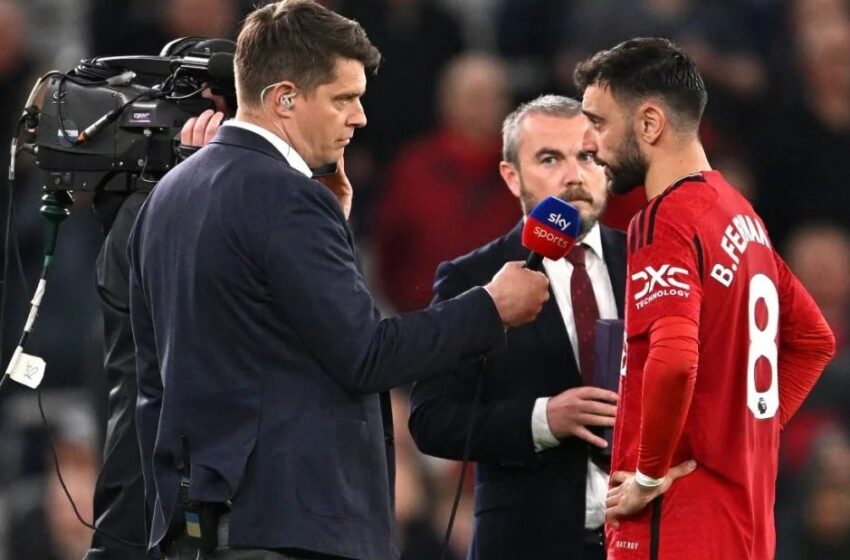EPL’s halftime interview fiasco: Going too far in football’s commercialization

Manchester United midfielder and captain Bruno Fernandes in a post-match interview with SkySports reporter. Photo Credit- Skysports/X
As the clock ticks toward the 2025/26 Premier League season, football fans are bracing for a change that threatens to erode the soul of the game. The league’s latest announcement: halftime interview with players or managers, alongside post-substitution touchline chats and dressing room broadcasts marks a bold, if misguided, leap into the realm of reality TV. This move, backed by a £6.7 billion TV deal with broadcasters like Sky Sports and TNT Sports, is being touted as a way to “enhance viewer experience.” But let’s call it what it is: a shameless cash grab that prioritizes corporate interests over the integrity of the sport.
Disruption disguised as innovation
Football’s halftime break has long been a sacred pause: a moment for players to regroup, strategize, and recharge. Coaches scribble plays on whiteboards, players gulp water and assess their bodies, and the tension of the first 45 minutes gives way to a brief respite. Now, imagine that scene interrupted by a microphone thrust into the face of a sweat-drenched midfielder or a fuming manager. The Premier League’s decision to mandate interview at these times in football games, inspired by the US sports model, risks turning a tactical intermission into a circus. There’s no peer-reviewed evidence, none that this enhances performance or engagement; it’s a speculative gamble driven by broadcasters hungry for content.
Imagine, impromptu halftime interview, managers caught off-guard can offer little, as focus clearly elsewhere. Multiply that awkwardness across 20 clubs, and you’ve got a recipe for disjointed, meaningless soundbites that do nothing for fans and everything for ad revenue. Players, already under immense physical and mental strain, deserve a break from the spotlight, not a mandate to perform for the camera.
RELATED STORIES
Mbuemo and Wissa: Best Attacking Duos in 2024/25 EPL Season
Haaland vs Maghalaes: Biggest Player Rivalries in EPL this Season
The substitution spotlight: cruelty in real time
Even more troubling is the plan to interview players immediately after being substituted. Picture this: a striker misses a sitter, costs his team a goal, and is hauled off in the 60th minute. Before he can even reach the bench, a reporter shoves a mic in his face, asking, “How are you feeling?” It’s a setup for humiliation, not insight. Fans on social media have already voiced the absurdity, with one imagining the dread of facing questions after a 5-0 drubbing by Arsenal. This isn’t journalism; it’s gratification, capitalizing on players’ vulnerability for cheap thrills.
The league’s justification, that it brings fans “closer to the action” is not significant. Fans don’t need to see a dejected winger stammer through an interview; they want to see him fight back on the pitch. Historical precedent, like the dignified silence or an applause for substituted players, shows a tradition of respect that this move tramples over. Instead of fostering connection, it risks alienating players and supporters alike.
Dressing room drama: privacy out, profits in
The proposal to broadcast from dressing rooms, even with rumored restrictions on team talks, crosses an ethical line. The locker room is a sanctuary, a place where raw emotion, strategy, and association unfold away from public scrutiny. Allowing cameras in, as suggested by football enthusiasts on social media, turns this private space into a stage. The 2025 Guardian report noted that 14 clubs were pressured to approve these changes, hinting at a top-down push that ignores player welfare. What happens when a heated exchange or a tearful breakdown is caught on tape? The league’s vague assurances of “certain restrictions” do little to address the fears of exploitation.
Betraying football’s culture
Football in England has always prided itself on tradition, unlike the glee and glamour of American sports, it’s rooted in community and authenticity. Yet, as some fans on social media have lamented, “The game’s gone; we are not Americans.” This shift toward US-style innovations feels like a betrayal of that heritage, driven by a £6.7 billion deal that increases clubs chests while reducing the sport’s essence. The public backlash on social media, with terms like “utter woke nonsense” and “plastic,” reflects a growing sentiment that the Premier League is losing touch with its fanbase.
Beyond the cultural clash, there’s a practical concern: player performance. No logic, either academic or otherwise, support the idea that mid-game interviews boost focus or morale. Instead, psychologists might argue the opposite: interrupting a player’s mental reset could lead to second-half slumps. Clubs like Manchester City, Chelsea, Manchester United, and Liverpool, already navigating high-pressure seasons, may find their squads distracted by this added layer of scrutiny. And for what? A few extra seconds of airtime to sell beer ads or promote gambling?
RELATED STORIES
FA’s inaction on Manchester City’s 115 charges: Was decision fair?
Salah, Diallo: Best African Players in the 2024/25 EPL Season
Final take
The Premier League has a chance to rethink this misstep before the season kicks off. Fans deserve a product that honors the game’s spirit, not one that turns players into puppets for profit. If the league insists on innovation, let it invest in better refereeing technology or grassroots development, not microphones in the dressing room. As the conversation heats up on social media with some suggesting referee interviews instead, it’s clear the appetite for change exists, but not at the cost of football’s soul. This halftime interview experiment isn’t progress; it’s a step backward. The Premier League must listen to its fans and players before the whistle blows on tradition itself.

